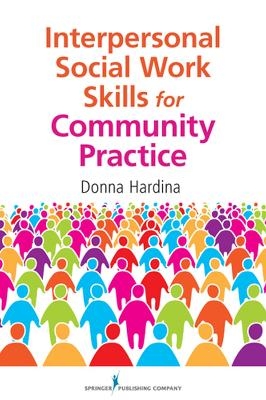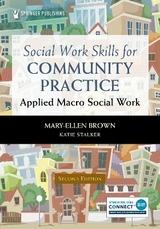
Interpersonal Social Work Skills for Community Practice
Seiten
2012
Springer Publishing Co Inc (Verlag)
978-0-8261-0811-1 (ISBN)
Springer Publishing Co Inc (Verlag)
978-0-8261-0811-1 (ISBN)
- Titel ist leider vergriffen;
keine Neuauflage - Artikel merken
Zu diesem Artikel existiert eine Nachauflage
Describes the essential interpersonal skills that social workers need in community practice and helps students cultivate them. Drawing from empirical literature on community social work practice and the author's own experience working with community organisers, the book focuses on developing the macro-level skills that are especially useful for community organising.
Community organization has been a major component of social work practice dating back to the late 19th century. It requires a diverse set of skills, many of which are not readily accessible to social work students. This textbook describes the essential skills that social workers need in community practice and helps students to acquire them. These skills include relationship-building, interviewing, recruitment, community assessment, facilitating group decision-making and task planning; creating successful interventions, working with organizations, and program evaluation. The text also addresses other important skills such as legislative advocacy, lobbying, and supervision.
; The author discusses the interpersonal skills needed for successful community practice and links these skills explicitly to curriculum models used to teach generalist social work practice. Drawing from the empirical literature on community practice and the author's own experience with community organizers, the book also includes examples of specific applications of these skills. The text is linked to the competences outlined in the Council of Social Work Education's (2008) Educational Policy and Accreditation Standards (EPAS) as well as ethics and values identified in the National Association of Social Workers' Code of Ethics and the International Federation of Social Workers' statement of ethical principles. Student exercises conclude each chapter.
; Key Features:
Describes the essential skills social workers need in community practice
Includes examples of specific applications drawn from empirical literature and the author's experience with community organizers
Grounded in social justice, strengths-based, and human rights perspectives
Linked to competencies outlined in EPAS and values identified in the NASW Code of Ethics
;|Community organization has been a major component of social work practice dating back to the late 19th century. It requires a diverse set of skills, many of which are not readily accessible to social work students. This textbook describes the essential skills that social workers need in community practice and helps students to acquire them. These skills include relationship-building, interviewing, recruitment, community assessment, facilitating group decision-making and task planning; creating successful interventions, working with organizations, and program evaluation. The text also addresses other important skills such as legislative advocacy, lobbying, and supervision.
; The author discusses the interpersonal skills needed for successful community practice and links these skills explicitly to curriculum models used to teach generalist social work practice. Drawing from the empirical literature on community practice and the author's own experience with community organizers, the book also includes examples of specific applications of these skills. The text is linked to the competences outlined in the Council of Social Work Education's (2008) Educational Policy and Accreditation Standards (EPAS) as well as ethics and values identified in the National Association of Social Workers' Code of Ethics and the International Federation of Social Workers' statement of ethical principles. Student exercises conclude each chapter.
; Key Features:
Describes the essential skills social workers need in community practice
Includes examples of specific applications drawn from empirical literature and the author's experience with community organizers
Grounded in social justice, strengths-based, and human rights perspectives
Linked to competencies outlined in EPAS and values identified in the NASW Code of Ethics
;|Community organization has been a major component of social work practice dating back to the late 19th century. It requires a diverse set of skills, many of which are not readily accessible to social work students. This textbook describes the essential skills that social workers need in community practice and helps students to acquire them. These skills include relationship-building, interviewing, recruitment, community assessment, facilitating group decision-making and task planning; creating successful interventions, working with organizations, and program evaluation. The text also addresses other important skills such as legislative advocacy, lobbying, and supervision.
; The author discusses the interpersonal skills needed for successful community practice and links these skills explicitly to curriculum models used to teach generalist social work practice. Drawing from the empirical literature on community practice and the author's own experience with community organizers, the book also includes examples of specific applications of these skills. The text is linked to the competences outlined in the Council of Social Work Education's (2008) Educational Policy and Accreditation Standards (EPAS) as well as ethics and values identified in the National Association of Social Workers' Code of Ethics and the International Federation of Social Workers' statement of ethical principles. Student exercises conclude each chapter.
; Key Features:
Describes the essential skills social workers need in community practice
Includes examples of specific applications drawn from empirical literature and the author's experience with community organizers
Grounded in social justice, strengths-based, and human rights perspectives
Linked to competencies outlined in EPAS and values identified in the NASW Code of Ethics
;|Community organization has been a major component of social work practice dating back to the late 19th century. It requires a diverse set of skills, many of which are not readily accessible to social work students. This textbook describes the essential skills that social workers need in community practice and helps students to acquire them. These skills include relationship-building, interviewing, recruitment, community assessment, facilitating group decision-making and task planning; creating successful interventions, working with organizations, and program evaluation. The text also addresses other important skills such as legislative advocacy, lobbying, and supervision.
; The author discusses the interpersonal skills needed for successful community practice and links these skills explicitly to curriculum models used to teach generalist social work practice. Drawing from the empirical literature on community practice and the author's own experience with community organizers, the book also includes examples of specific applications of these skills. The text is linked to the competences outlined in the Council of Social Work Education's (2008) Educational Policy and Accreditation Standards (EPAS) as well as ethics and values identified in the National Association of Social Workers' Code of Ethics and the International Federation of Social Workers' statement of ethical principles. Student exercises conclude each chapter.
; Key Features:
Describes the essential skills social workers need in community practice
Includes examples of specific applications drawn from empirical literature and the author's experience with community organizers
Grounded in social justice, strengths-based, and human rights perspectives
Linked to competencies outlined in EPAS and values identified in the NASW Code of Ethics
;
Community organization has been a major component of social work practice dating back to the late 19th century. It requires a diverse set of skills, many of which are not readily accessible to social work students. This textbook describes the essential skills that social workers need in community practice and helps students to acquire them. These skills include relationship-building, interviewing, recruitment, community assessment, facilitating group decision-making and task planning; creating successful interventions, working with organizations, and program evaluation. The text also addresses other important skills such as legislative advocacy, lobbying, and supervision.
; The author discusses the interpersonal skills needed for successful community practice and links these skills explicitly to curriculum models used to teach generalist social work practice. Drawing from the empirical literature on community practice and the author's own experience with community organizers, the book also includes examples of specific applications of these skills. The text is linked to the competences outlined in the Council of Social Work Education's (2008) Educational Policy and Accreditation Standards (EPAS) as well as ethics and values identified in the National Association of Social Workers' Code of Ethics and the International Federation of Social Workers' statement of ethical principles. Student exercises conclude each chapter.
; Key Features:
Describes the essential skills social workers need in community practice
Includes examples of specific applications drawn from empirical literature and the author's experience with community organizers
Grounded in social justice, strengths-based, and human rights perspectives
Linked to competencies outlined in EPAS and values identified in the NASW Code of Ethics
;|Community organization has been a major component of social work practice dating back to the late 19th century. It requires a diverse set of skills, many of which are not readily accessible to social work students. This textbook describes the essential skills that social workers need in community practice and helps students to acquire them. These skills include relationship-building, interviewing, recruitment, community assessment, facilitating group decision-making and task planning; creating successful interventions, working with organizations, and program evaluation. The text also addresses other important skills such as legislative advocacy, lobbying, and supervision.
; The author discusses the interpersonal skills needed for successful community practice and links these skills explicitly to curriculum models used to teach generalist social work practice. Drawing from the empirical literature on community practice and the author's own experience with community organizers, the book also includes examples of specific applications of these skills. The text is linked to the competences outlined in the Council of Social Work Education's (2008) Educational Policy and Accreditation Standards (EPAS) as well as ethics and values identified in the National Association of Social Workers' Code of Ethics and the International Federation of Social Workers' statement of ethical principles. Student exercises conclude each chapter.
; Key Features:
Describes the essential skills social workers need in community practice
Includes examples of specific applications drawn from empirical literature and the author's experience with community organizers
Grounded in social justice, strengths-based, and human rights perspectives
Linked to competencies outlined in EPAS and values identified in the NASW Code of Ethics
;|Community organization has been a major component of social work practice dating back to the late 19th century. It requires a diverse set of skills, many of which are not readily accessible to social work students. This textbook describes the essential skills that social workers need in community practice and helps students to acquire them. These skills include relationship-building, interviewing, recruitment, community assessment, facilitating group decision-making and task planning; creating successful interventions, working with organizations, and program evaluation. The text also addresses other important skills such as legislative advocacy, lobbying, and supervision.
; The author discusses the interpersonal skills needed for successful community practice and links these skills explicitly to curriculum models used to teach generalist social work practice. Drawing from the empirical literature on community practice and the author's own experience with community organizers, the book also includes examples of specific applications of these skills. The text is linked to the competences outlined in the Council of Social Work Education's (2008) Educational Policy and Accreditation Standards (EPAS) as well as ethics and values identified in the National Association of Social Workers' Code of Ethics and the International Federation of Social Workers' statement of ethical principles. Student exercises conclude each chapter.
; Key Features:
Describes the essential skills social workers need in community practice
Includes examples of specific applications drawn from empirical literature and the author's experience with community organizers
Grounded in social justice, strengths-based, and human rights perspectives
Linked to competencies outlined in EPAS and values identified in the NASW Code of Ethics
;|Community organization has been a major component of social work practice dating back to the late 19th century. It requires a diverse set of skills, many of which are not readily accessible to social work students. This textbook describes the essential skills that social workers need in community practice and helps students to acquire them. These skills include relationship-building, interviewing, recruitment, community assessment, facilitating group decision-making and task planning; creating successful interventions, working with organizations, and program evaluation. The text also addresses other important skills such as legislative advocacy, lobbying, and supervision.
; The author discusses the interpersonal skills needed for successful community practice and links these skills explicitly to curriculum models used to teach generalist social work practice. Drawing from the empirical literature on community practice and the author's own experience with community organizers, the book also includes examples of specific applications of these skills. The text is linked to the competences outlined in the Council of Social Work Education's (2008) Educational Policy and Accreditation Standards (EPAS) as well as ethics and values identified in the National Association of Social Workers' Code of Ethics and the International Federation of Social Workers' statement of ethical principles. Student exercises conclude each chapter.
; Key Features:
Describes the essential skills social workers need in community practice
Includes examples of specific applications drawn from empirical literature and the author's experience with community organizers
Grounded in social justice, strengths-based, and human rights perspectives
Linked to competencies outlined in EPAS and values identified in the NASW Code of Ethics
;
Donna Hardina, MSW, PhD, is a Professor in the Department of Social Work Education at California State University-Fresno. Her practice experience includes case advocacy, community organization, and nonprofit management. Dr. Hardina has written extensively on nonprofit management, community organization, and social welfare policy. She is the author of An Empowering Approach to Managing Social Service Organizations (2006), Analytical Skills for Community Organization Practice (2002), and numerous journal articles.
| Verlagsort | New York |
|---|---|
| Sprache | englisch |
| Gewicht | 540 g |
| Themenwelt | Sozialwissenschaften ► Pädagogik ► Sozialpädagogik |
| Sozialwissenschaften ► Soziologie | |
| ISBN-10 | 0-8261-0811-3 / 0826108113 |
| ISBN-13 | 978-0-8261-0811-1 / 9780826108111 |
| Zustand | Neuware |
| Haben Sie eine Frage zum Produkt? |
Mehr entdecken
aus dem Bereich
aus dem Bereich
Grundlagen - Konzepte - Methoden
Buch | Softcover (2023)
Kohlhammer (Verlag)
34,00 €
ein Lehrbuch zum Kita-Management
Buch | Softcover (2023)
Kohlhammer (Verlag)
46,00 €
Orientierungswissen für die Soziale Arbeit
Buch | Softcover (2024)
Kohlhammer (Verlag)
36,00 €



